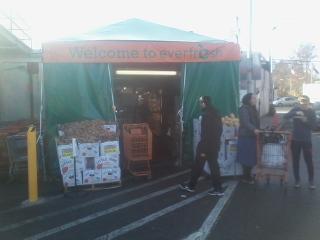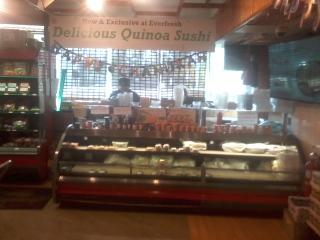Everfresh in Great Neck, New York
I grew up in a rapidly changing neighborhood located just east of Queens on Long Island. When I was born in North Great Neck the neighborhood was split almost 50-50 between Jews of various origins and Christians of various origins. I was born in an African-American section of North Great Neck as a young child so most of my family’s friends were African-American and there were a number of thriving churches. By the time I was 14 my public high school was 68% Persian Jewish and around 90% Jewish overall. Most of my friends were Middle Eastern and a number of slang words we used were Farsi. The section of town I grew up in now has three synagogues and now largely Hispanic and Jewish.
To help convey a sense of the changing nature of Great Neck I visited the local supermarket my family shops at: Everfresh. Everfresh was opened six years ago on what was previously the sight of a traditional, mainstream American supermarket. Everfresh caters primarily to the religious Jewish community in Great Neck. While the majority of people who shop at Everfresh are Mizrahi the store also caters to the religious Sephardic and Ashkenazi communities. I’d say about 50% of the men in the shop wear yarmulkes. Even though the store tends to cater more to the religious, a number of secular or non-religious people (like my family) also shop at the store. However, products that would be considered offensive to the majority of the customers are absent (pork, shellfish, other non-kosher foods etc. etc.). While the customer base is entirely Jewish most of the employees tend to be from a Hispanic section of Great Neck located close to where I live.
The majority of people shopping in the store are wealthy. This is reflective largely of the economic make-up of Northern Great Neck. That said, the store doesn’t really cater specifically to wealthy people. The products are of a high quality but the neighborhood and culture tend to emphasize frugality and calculated expenditures as important values so the store reflects this by providing good deals and high quality food rather than trying to seem fancy or provide some kind of decadent ambiance.
Here are some Wikipedia links that distinguish between the three major Jewish communities:

Due to the fact that Israel is mostly composed of Sephardic and Mizrahi Jews and that a large number of the Sephardic and Mizrahi Jews in Great Neck are actually recent immigrants from Israel. Everfresh tends to look like a typical supermarket in Israel does. There are a number of different types of rice, spices, kosher meats, nuts and dried fruit. There are also a number of products that cater to specific regions of the Middle East that people have ancestry from (for example: Syrian cheese and ingredients for making the Iranian national dish “gormeh sabzi”). That said there are also Ashkenazi products that only European Jews eat like gefilte fish. I attempted to interview the management and shoppers but none were willing to be photographed or interviewed.
The store is located on the only commercial street in our neighborhood. Southern Great Neck has a sizable downtown section but in Northern Great Neck all of the industry is focused on one street called Middle Neck Road. The street largely consists of small mom and pop food shops like butchers, bagel stores, and restaurants but there are also a couple of pharmacies and banks. Most of the food stores tend to cater to Middle Eastern or religious Jewish populations but there are a number of non-kosher food stores and restaurants that do well by catering to non-Jews or non-religious Jews although the number of stores that exist like this has declined in recent years. All these stores, even national banks, close on Friday night and all throughout Saturday in accordance with local religious custom. Unfortunately, even stores that are owned by non-Jews or non-religious Jews all close on Saturday as warranting offense from the more religious elements in the neighborhood could result in a massive loss in business.
In class we had a discussion about authenticity in Azabu-Juban and Shimokitazawa Japan in the face of increasing globalization as was discussed in the reading for class. More importantly, the question was raised as to what made a neighborhood authentic. I feel like authenticity comes from a neighborhood accurately representing itself. My neighborhood has changed and with this change the shops that were once diners selling hamburgers are now Persian restaurants selling chelow kebab or tadigh. I don’t feel that the neighborhood has become any less authentic though because these restaurants accurately represent the people who live there. No one in my neighborhood eats hamburgers and therefore there are no restaurants that serve them. Exporting some external culture whether it be a Western chain coming to Japan or a hamburger restaurant coming to North Great Neck is what I feel erodes a place’s authenticity.
Jacob Mevorach ’16

